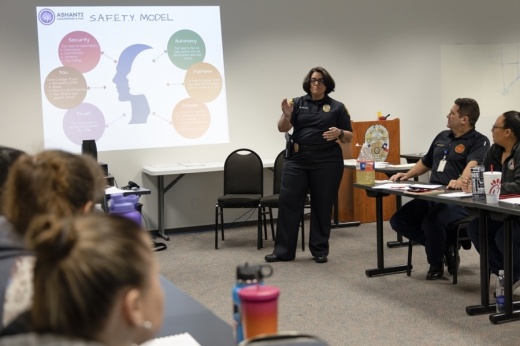The department's new initiative will include a crisis intervention team with a focus on new curriculum for training officers on responding to mental health calls, said Brittany Moreno, an SLPD officer and the leader of the crisis intervention team. Moreno has more than 11 years of experience in the department with a specialization in mental health.
The team will help train the department and implement safer techniques when responding to mental health crisis calls through a variety of newly introduced strategies.
In addition to the intervention team, the department as a whole will focus on building relationships with the community and introducing these modern training techniques alongside mental health professionals, Moreno said. She said these implementations aim to create a safer environment for citizens and officers while reducing unwanted large medical bills for those who attend hospitals due to mental health issues.
“We don't want people to be afraid to call the police department when their loved one has a mental health crisis. We want them to reach out to us,” Moreno said. “Our goal is to make sure that person is safe and gets help safely. We also don't want them to go to the [emergency room] and walk out with a huge bill.”
A new tactic
The new team and departmentwide training are being introduced at a crucial time in response to the growing number of mental health emergencies locally and nationwide.
In April, the SLPD responded to more than 10 calls related to mental health crises alone, according to a news release from the city of Sugar Land.
“I've been here a little over 11 years, and these calls are starting to increase more and more,” Moreno said.
From July 2022 through early May 2023, she counted more than 700 calls related to mental health issues.
However, the growing number of mental health calls is also a national trend, and police departments have been forming crisis intervention teams, or CITs, to address this need since the 1980s, according to an October 2021 report published in Psychiatric Services, a journal of the American Psychiatric Association. The first CIT began in the late 1980s in Memphis in response to a police shooting of a Black man with mental illness, per the report.
The report says 5%-15% of 911 emergency calls are for behavioral health emergencies. The CIT training model gives law enforcement the training to allow them to identify and de-escalate individuals who are in a mental health crisis, helping to divert the person into treatment, according to the report.
“It is becoming an issue nationwide, and there are a lot of cities that are creating crisis intervention teams. Some cities are even partnering up with ambulances and clinicians when they go answer the call,” Moreno said.
The response to these calls is where many of the difficulties lie for police officers, many of whom are the first responders on sight.
“One of the things we recognize right off the bat is when we take someone to get help at a hospital ER or mental health facility, sometimes we were not understanding what the initial problem is,” Moreno said. “Also, the facilities are not always completely understanding the information we were asking for or why we were asking for it, so we hit roadblocks.”
The SLPD will not necessarily hire new officers specifically for this crime intervention team to respond to these mental health calls, but it will train seasoned officers with at least two years of experience on the force more thoroughly with this specialized initiative, she said.
The police department plans to provide a new variety of training for officers with a curriculum that is created by and taught alongside mental health professionals, according to the city’s release. The new training will include 40-hour crisis interventions classes, de-escalation classes, first aid classes, mental health classes, traumatic brain injury classes, and other courses relative to brain behavior and drug addiction.
Additionally, the department decided to collectively bring all the stakeholders together for mental health partnership meetings to maintain an approach toward training for mental health calls. These meetings are composed of representatives of mental health facilities, hospitals and neighboring police agencies as well as the department's command staff, Moreno said.
“We bring together our challenges, the resources we have and ideas that we have to overcome these obstacles that make it hard for people to get help,” Moreno said.





